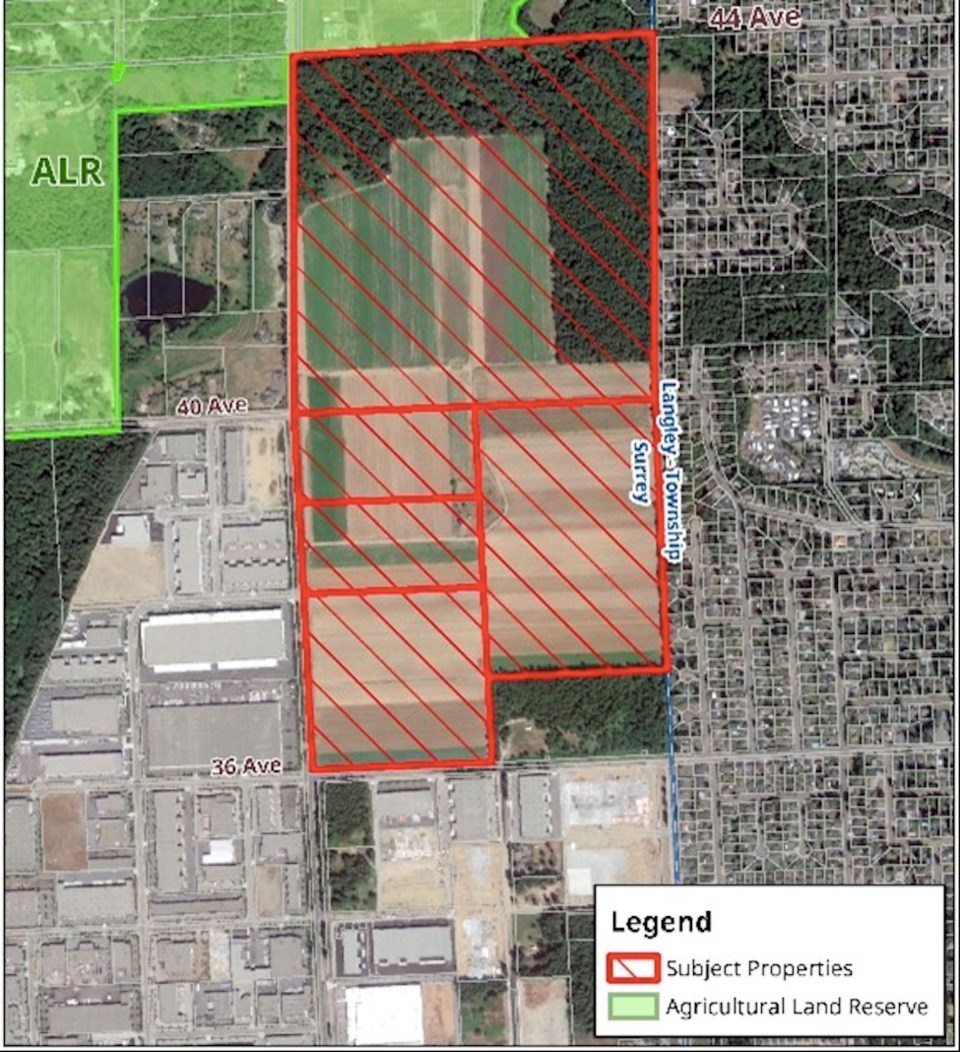Critics say a bid by the province’s Agricultural Land Commission to protect more than 300 acres of prime farmland in Surrey doesn’t take into account the full range of competing land uses in the region.
Submissions by the Greater Vancouver Board of Trade and commercial real estate association NAIOP were the only two of 365 written submissions to the ALC in advance of a public hearing Jan. 23 critical of the proposed inclusion, originally announced in December.
“NAIOP Vancouver would like to express its strong opposition for the inclusion of further lands into the Agricultural Land Reserve without full consultation with all stakeholders,” NAIOP Vancouver executive director Paul Kool wrote in a submission Monday. “This is an important and compelling example of the future potential of strategically-located land being limited at a time when there is a critical shortage of industrial land in our region.”
Metro Vancouver’s industrial vacancy rate is currently 0.2 per cent, according to Colliers International, among the lowest in North America. Net absorption of space last year was 4.44 million square feet, slightly more than the 4.37 million square feet delivered to the market. While there’s 6.9 million square feet under construction, much of it is already spoken for, meaning availability is unlikely to change in the near future.
“Prospective occupiers of industrial space need to plan ahead, sometimes over a year in advance, to secure their future spaces,” Colliers reported earlier this month.
This is in sharp contrast to farming operations, according to Bridgitte Anderson, president and CEO of the Greater Vancouver Board of Trade, who also pushed back against the proposed inclusion.
“These conversations need to be inclusive of the variety of competing land-use needs across the entire region,” she said, noting the region’s acute shortage of affordable housing and industrial land.
“We are facing an alarming and worsening housing availability and affordability crisis as well as a severe shortage of industrial land,” she wrote. “Constrained land availability and competition for space has led to a record low industrial vacancy rate (among the lowest in North America’s major markets) and skyrocketing rental rates across the region, making it a tremendous challenge for businesses to find the space they need to grow and expand in our region.”
Meanwhile, Anderson’s submission claimed that less than half the protected farmland in B.C. is actively farmed.
However, this isn’t the case with the five parcels in question, which together total 305 acres on the Surrey-Langley border west of 192 Street. Owned by the federal government, they’ve been deemed surplus and Public Works and Procurement Canada is undertaking due diligence prior to disposing of them. But 220 acres are leased to Heppell’s Potato Corp., which has been raising the alarm about the potential loss of the lands if Ottawa sells them.
Heppell’s has farmed the land on long-term leases from the federal government since 1974. It is a key supplier of fresh potatoes to the BC market, noting that it produced 70 percent of B.C.’s domestic potatoes last summer.
“The potential loss of this area would equal a clear deterioration of regional food security in Canada and the resilience of Western Canada’s food system,” the BC Agriculture Council said in its submission.
The strategic location of the land, which sits adjacent to the Campbell Heights industrial area is undeniable, however. With the existing Campbell Heights industrial expected to be built-out within the next few years, pressure on adjacent land is expected to increase.
Senior levels of government have shown themselves unwilling to jeopardize certain parcels, however.
In November 2021, the federal government nixed a bid by CP to establish a logistics park in Pitt Meadows that would have developed 100 acres of provincially protected farmland.
A date for a decision on the Campbell Heights inclusion bid has not been set.



